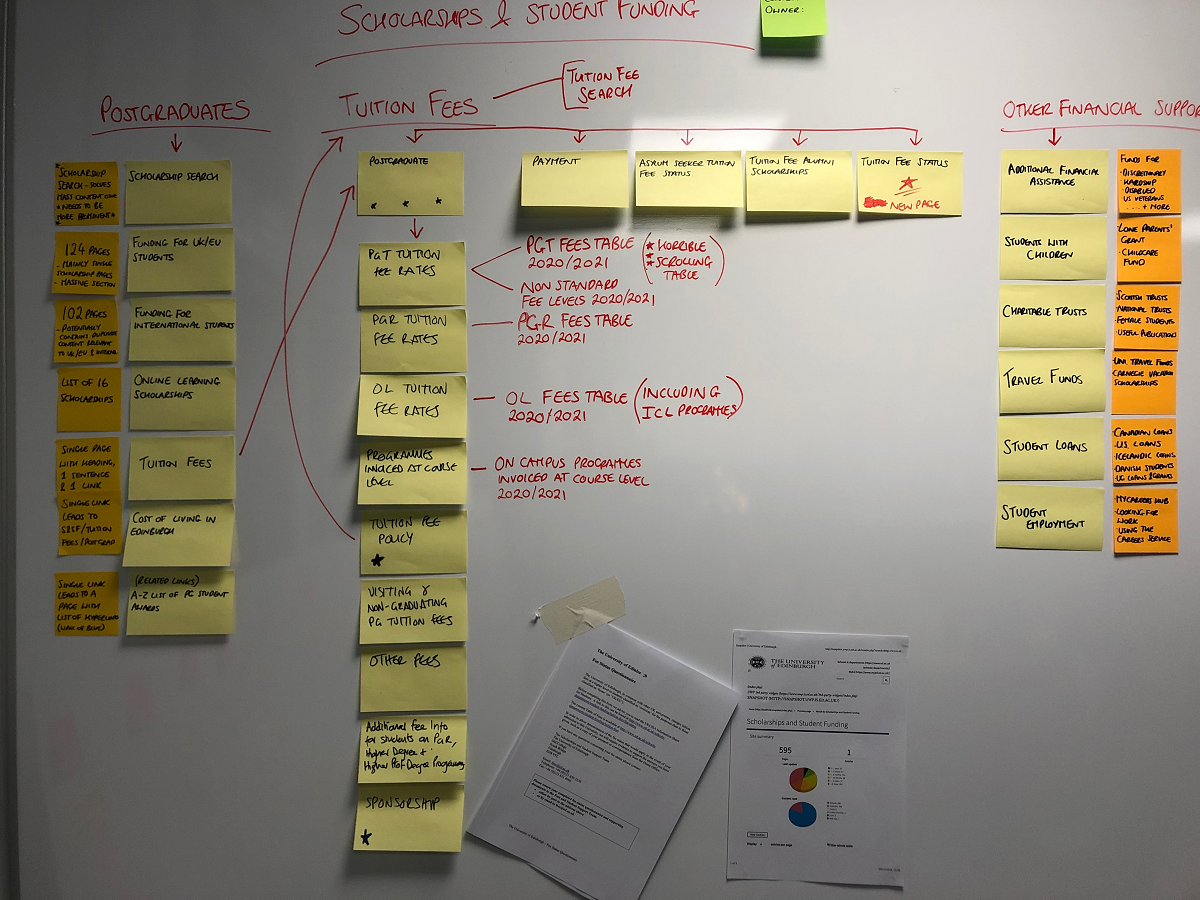Sprint 4 review: Our final sprint of 2019 – understanding the postgraduate fees journey
We’ve finished our last fortnightly sprint before Christmas. Much of the focus of this, our 4th sprint, was on the existing postgraduate fees experience.
It has been a productive two weeks and we’ve managed to uncover a few final parcels of valuable insight before festivities begin!
Read on for a quick overview of what we’ve found.
Highlights from sprint 4
The bulk of our activities through the 4th sprint centred on our Building user research epic and getting to grips with the postgraduate fees user journey. We’ve evidenced a wealth of insight here having:
Researched and mapped out the existing content journey
We found that:
- The central study section largely acts as a signpost for the user, with little substance.
- The degree finder contains useful information about fees, but not in detail where it needs to be.
- Fees pages consistently appear in top-10 content requirements within the PG prospective student journey.
- Three steps on from landing on a degree finder page, people are still looking for fees information.
- In fact, 80% of people who visit degree finder pages still go on to look for further info, including fees. This indicates that the content is not detailed enough.
- Of the prospective students who visit the scholarships and student funding site – nobody was searching for fees information. It was all related to scholarships and programmes.

Of the prospective students who visit the scholarships and student funding site – nobody was searching for fees information. It was all related to scholarships and programmes.
Observed the team who handle fees and student support enquiries
We met with the Fees and Student Support Team at their office at Old College.
Our visit was observational – watching the team deal with enquiries in person, emails and phone calls.
Common enquiries revolved around student’s fee status. The team have to conduct a thorough assessment using the information provided in an applicant’s application.
Calculating an applicant’s fee status is a big responsibility as the fees they pay depend on their fee status for the duration of their study.
Our visit helped us to learn more about the team’s roles, activities and challenges. We plan to learn more about the team and their business processes in an upcoming workshop.
The workshop will allow us to playback our research findings and collaboratively define the areas to focus upon. We’ll be mapping out those improvements that will have the greatest impact for both end users and the service.
Interviewed taught postgraduate staff
We interviewed seven staff members to understand the enquiries they receive and how they support them. We found that correspondence is mainly via email, with key enquiries being:
- How do I get onto this programme?
- Which program do I do in this sort of area of interest?
- I’ve done my application when do I get a decision?
- Can you tell me the entry requirements?
- How much does it cost? [Distance learners struggle mostly with fee info, fee figure not clear that it’s for current academic year]
- How do I pay?
- How do I pay the application fee?
- How do I apply?
While distance learners commonly asked:
- Do I have to come to Edinburgh for assessments?
- Do I attend a place for an exam?
- How will I be assessed?
Participants typically referred students to the degree finder and table of fees (apart from the Business School).
Gathered samples to identify the concerns and language of our users
Finally, we also scrutinised the similarities in enquiries across different stages of the application process (pre-application, applying, applied, and received offer).
We found that:
- At pre-application: people are concerned with tuition fees and funding (particularly EU and international).
- If people are applying (or have already applied) they are concerned with how to pay fees.
- Finally, if people have received an offer, they are often concerned with paying the deposit and refunds.
What’s next?
Looking towards Sprint-5, much of our effort will focus on bringing the UG information up-to-date. The work is progressing well, and the new GatherContent software, which we’re using to collaborate on programme edits with colleagues, seems to be working a treat.
Why not help us?
We are running regular events in the next few months to showcase our research. Your input here is very much welcome and we always consider your comments and feedback.
Remember, you can get involved by signing up to our mailing list while you can email us directly at cam-student-content@ed.ac.uk




1 replies to “Sprint 4 review: Our final sprint of 2019 – understanding the postgraduate fees journey”